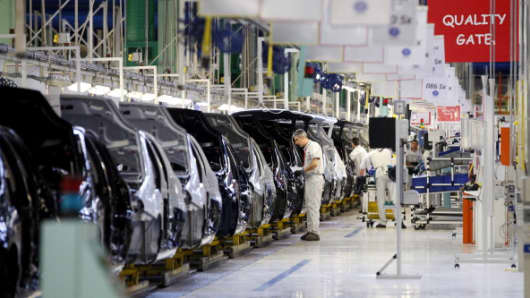Manufacturing output in the euro zone improved in June to a 16-month high, a sign that the economy was stabilizing, albeit slowly.
The euro zone June Purchasing Managers' Index for the manufacturing sector rose to a 16-month high of 48.8, up from the flash estimate of 48.7 and May's reading of 48.3.
But the readings for individual countries revealed a more mixed picture.
The data were particularly strong for Italy, where June manufacturing PMI rose to 49.1, the highest since July 2011 and Spain, where manufacturing PMI rose to 50 in June from 48.1 in May. French PMI also rose to 48.4 in June from 46.4 in May. A reading above 50 indicates an expansion, while a reading below indicates a contraction.
However, German manufacturing activity contracted for the fourth consecutive month in June, coming in below expectations at 48.6.
"I think it tells us two things. One, it tells us that the euro zone as a whole is gradually beginning to stabilize. I think that's obviously very good news. Probably, the more important part of the data is the split and the fact that we are beginning to see stronger PMI data from the likes of Spain and Italy. That may settle some people's concerns about the recovery in those countries," Darren Williams of AllianceBernstein told CNBC.
The euro zone has been in a recession for a year-and-a-half and any signs of stabilization will ease pressure on the European Central Bank to expand monetary policy to boost growth.
"June's improved purchasing managers' survey supports hopes that overall manufacturing activity across the euro zone is on the brink of stabilization. This reinforces hopes that euro zone GDP could finally have stopped contracting in the second quarter after a record six quarters of decline," Howard Archer, European economist at IHS Global Insight said.
But Archer added that conditions remain far from easy for euro zone manufacturers. "The upside for domestic demand in the euro zone remains constrained by restrictive fiscal policy in many countries (despite increased flexibility now being allowed on fiscal targets), still tight credit conditions, high and rising unemployment, and limited consumer purchasing power."
The PMI readings came ahead of inflation data which showed that euro zone consumer inflation accelerated to 1.6 percent in June from 1.4 percent in May. Meanwhile, unemployment for the euro zone rose to a record high 12.1 percent in May, from a revised rate of 12 percent in April.



